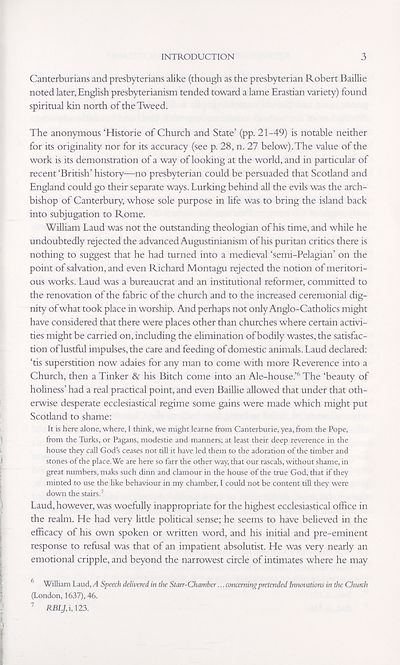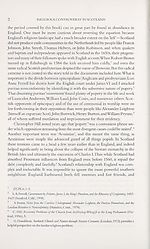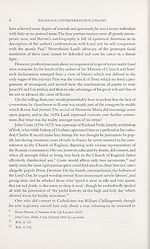Series 5 > Religious Controversy in Scotland 1625-1639
(18) Page 3
Download files
Complete book:
Individual page:
Thumbnail gallery: Grid view | List view

INTRODUCTION
3
Canterburians and presbyterians alike (though as the presbyterian Robert Baillie
noted later, English presbyterianism tended toward a lame Erastian variety) found
spiritual kin north of the Tweed.
The anonymous ‘Historic of Church and State’ (pp. 21-49) is notable neither
for its originality nor for its accuracy (see p. 28, n. 27 below). The value of the
work is its demonstration of a way of looking at the world, and in particular of
recent ‘British’ history—no presbyterian could be persuaded that Scodand and
England could go their separate ways. Lurking behind all the evils was the arch¬
bishop of Canterbury, whose sole purpose in life was to bring the island back
into subjugation to Rome.
Wilham Laud was not the outstanding theologian of his time, and while he
undoubtedly rejected the advanced Augustinianism of his puritan critics there is
nothing to suggest that he had turned into a medieval ‘semi-Pelagian’ on the
point of salvation, and even Richard Montagu rejected the notion of meritori¬
ous works. Laud was a bureaucrat and an institutional reformer, committed to
the renovation of the fabric of the church and to the increased ceremonial dig¬
nity of what took place in worship. And perhaps not onlyAnglo-Catholics might
have considered that there were places other than churches where certain activi¬
ties might be carried on, including the elimination of bodily wastes, the satisfac¬
tion of lustful impulses, the care and feeding of domestic animals. Laud declared:
‘tis superstition now adaies for any man to come with more Reverence into a
Church, then a Tinker & his Bitch come into an Ale-house.’6 The ‘beauty of
holiness’ had a real practical point, and even Baillie allowed that under that oth¬
erwise desperate ecclesiastical regime some gains were made which might put
Scotland to shame:
It is here alone, where, I think, we might learne from Canterburie, yea, from the Pope,
from the Turks, or Pagans, modestie and manners; at least their deep reverence in the
house they call God’s ceases not till it have led them to the adoration of the timber and
stones of the place. We are here so farr the other way, that our rascals, without shame, in
great numbers, maks such dinn and clamour in the house of the true God, that if they
minted to use the like behaviour in my chamber, I could not be content till they were
down the stairs.7
Laud, however, was woefully inappropriate for the highest ecclesiastical office in
the realm. He had very little political sense; he seems to have beHeved in the
efficacy of his own spoken or written word, and his initial and pre-eminent
response to refusal was that of an impatient absolutist. He was very nearly an
emotional cripple, and beyond the narrowest circle of intimates where he may
William Laud, A Speech delivered in the Stan-Chamber ...concerningpretended Innovations in the Church
(London, 1637), 46.
7 RBLJX123.
3
Canterburians and presbyterians alike (though as the presbyterian Robert Baillie
noted later, English presbyterianism tended toward a lame Erastian variety) found
spiritual kin north of the Tweed.
The anonymous ‘Historic of Church and State’ (pp. 21-49) is notable neither
for its originality nor for its accuracy (see p. 28, n. 27 below). The value of the
work is its demonstration of a way of looking at the world, and in particular of
recent ‘British’ history—no presbyterian could be persuaded that Scodand and
England could go their separate ways. Lurking behind all the evils was the arch¬
bishop of Canterbury, whose sole purpose in life was to bring the island back
into subjugation to Rome.
Wilham Laud was not the outstanding theologian of his time, and while he
undoubtedly rejected the advanced Augustinianism of his puritan critics there is
nothing to suggest that he had turned into a medieval ‘semi-Pelagian’ on the
point of salvation, and even Richard Montagu rejected the notion of meritori¬
ous works. Laud was a bureaucrat and an institutional reformer, committed to
the renovation of the fabric of the church and to the increased ceremonial dig¬
nity of what took place in worship. And perhaps not onlyAnglo-Catholics might
have considered that there were places other than churches where certain activi¬
ties might be carried on, including the elimination of bodily wastes, the satisfac¬
tion of lustful impulses, the care and feeding of domestic animals. Laud declared:
‘tis superstition now adaies for any man to come with more Reverence into a
Church, then a Tinker & his Bitch come into an Ale-house.’6 The ‘beauty of
holiness’ had a real practical point, and even Baillie allowed that under that oth¬
erwise desperate ecclesiastical regime some gains were made which might put
Scotland to shame:
It is here alone, where, I think, we might learne from Canterburie, yea, from the Pope,
from the Turks, or Pagans, modestie and manners; at least their deep reverence in the
house they call God’s ceases not till it have led them to the adoration of the timber and
stones of the place. We are here so farr the other way, that our rascals, without shame, in
great numbers, maks such dinn and clamour in the house of the true God, that if they
minted to use the like behaviour in my chamber, I could not be content till they were
down the stairs.7
Laud, however, was woefully inappropriate for the highest ecclesiastical office in
the realm. He had very little political sense; he seems to have beHeved in the
efficacy of his own spoken or written word, and his initial and pre-eminent
response to refusal was that of an impatient absolutist. He was very nearly an
emotional cripple, and beyond the narrowest circle of intimates where he may
William Laud, A Speech delivered in the Stan-Chamber ...concerningpretended Innovations in the Church
(London, 1637), 46.
7 RBLJX123.
Set display mode to:
![]() Universal Viewer |
Universal Viewer | ![]() Mirador |
Large image | Transcription
Mirador |
Large image | Transcription
Images and transcriptions on this page, including medium image downloads, may be used under the Creative Commons Attribution 4.0 International Licence unless otherwise stated. ![]()
| Scottish History Society volumes > Series 5 > Religious Controversy in Scotland 1625-1639 > (18) Page 3 |
|---|
| Permanent URL | https://digital.nls.uk/127328181 |
|---|
| Description | Over 180 volumes, published by the Scottish History Society, containing original sources on Scotland's history and people. With a wide range of subjects, the books collectively cover all periods from the 12th to 20th centuries, and reflect changing trends in Scottish history. Sources are accompanied by scholarly interpretation, references and bibliographies. Volumes are usually published annually, and more digitised volumes will be added as they become available. |
|---|


